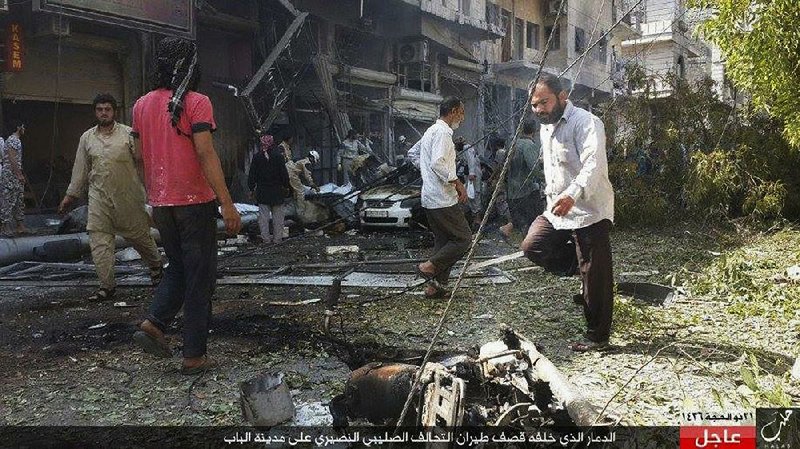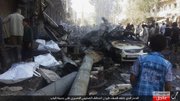MOSCOW -- Russia signaled deepening intervention Monday in the Syria war, strongly hinting that its "volunteer" ground forces would soon be fighting there, as NATO officials warned the Kremlin after two Russian warplanes invaded Turkey's airspace.
Russia called the first air incursion an innocent mistake because of foul weather, a claim that the Americans rejected.
The addition of Russian ground forces to the assaults already underway by Russian warplanes particularly threatens to undermine Turkey's Syria policy, which aims for the establishment of a "safe zone" along the Turkish border where some Syrian refugees could return in the future.
Russia and Iran have moved aggressively in the past few weeks to strengthen their ally, President Bashar Assad of Syria. The assistance has raised the possibility of a new ground offensive by Assad's forces against groups of fighters including those backed by the United States, Turkey and their allies, which want Assad to leave power.
Russia has openly acknowledged sending warplanes and other military equipment to bolster Assad. Although President Vladimir Putin has ruled out sending ground forces to Syria, a senior Kremlin defense official told Russian news agencies Monday that military veterans who had fought in eastern Ukraine would likely start showing up as "volunteer" ground forces in Syria.
The statement by the official, Adm. Vladimir Komoyedov, head of the armed forces committee in Russia's parliament, asserted that such volunteers "cannot be stopped."
Komoyedov's statement was the strongest signal yet of Russia's intentions. It echoed Russia's use of shadowy ground forces in other conflicts over the past year -- most notably its seizure of Crimea from Ukraine in March 2014 and its assistance to insurgents in eastern Ukraine.
Russia also appears to be establishing what amounts to a "front line" extending from the central city of Hama to the town of Latakia, where Russian warplanes are operating out of an expanded air base, according to a senior U.S. defense official.
U.S. officials have noted, he said, signs of an expanded Russian military buildup at an equestrian club on the outskirts of Hama. The buildup includes Russian personnel and four BM-30 Smerch multiple-rocket-launching systems, suggesting Russia may be planning to oversee a ground offensive aimed at capturing rebel-held territory in the northwest of the country.
U.S. military officials said they believed more than 600 Russian military personnel were already on the ground in Syria, not counting aircrews, and that tents for nearly 2,000 people had been seen at Russia's air base near Latakia, in northwest Syria near the Turkish border.
Russia's escalation has come as the Americans and Turks are intensifying their aerial attacks to pressure the Islamic State extremist group, which has seized swaths of Syria and Iraq.
The Americans see the Islamic State as the most dangerous, immediate threat. They view Russia's moves as prolonging and possibly widening the war, even if Russian forces also are hitting Islamic State targets, as the Russians assert.
Russia's intervention already appears to have subverted diplomatic efforts led by a special U.N. envoy, Staffan de Mistura, to halt the war. Forty-one rebel factions who oppose Assad said in a statement on Monday that Russia's "brutal occupation has cut the road to any political solution."
The groups vowed to attack Russian forces in retaliation for Moscow's air campaign in a show of unity among the usually fragmented rebels against what they called the "occupiers" of Syria.
The groups, which included powerful factions such as Ahrar al-Sham, Islam Army and the Levant Front, said Russia joined the war in Syria after Assad's forces were on the verge "of a crushing defeat."
Russia launched its air campaign Wednesday and claims it's targeting the Islamic State group and al-Qaida's Syrian affiliate, the Nusra Front. But many of the strikes appear to have hit Western-backed rebel factions.
The Russian intervention was widely criticized by Syrian opposition groups and activists, especially since Moscow once played the role of a mediator hosting rounds of talks between the Syrian government and its opponents.
U.S. and European leaders have complained that Russia's 6-day-old air campaign has so far overwhelmingly targeted not the Islamic State but the anti-Assad rebellion, including groups backed by the United States and its allies.
Airspace violations
The first Russian warplane's incursion into Turkish airspace, which happened Saturday, elicited a blunt protest from Turkey, a NATO member. Turkish fighter jets intercepted the warplane.
NATO said another Russian jet intruded into Turkey's airspace Sunday, and it called urgent consultations on the issue. The alliance strongly protested the Russian violations and noted "the extreme danger of such irresponsible behavior."
The United States began what officials called urgent consultations with Turkey.
Russia's actions were "an unacceptable violation" of Turkish airspace, NATO's secretary-general, Jens Stoltenberg, said after meeting with the Turkish foreign minister, Feridun Sinirlioglu. Stoltenberg added, "Russia's actions are not contributing to the security and stability of the region."
Secretary of State John Kerry, in Chile for an ocean environmental conference, said the incident could have led to Turkey shooting down the Russian plane.
"We're very concerned about it ... and it is precisely the kind of thing we warned about," he told reporters, saying Russia has a responsibility to act within international standards.
Defense Secretary Ashton Carter, speaking in Madrid during a news conference with his Spanish counterpart, said U.S. officials were conferring with Turkish counterparts over next steps.
Carter said he continues to hope that Russian President Vladimir Putin "will see that tethering Russia to a sinking ship is a losing strategy" and that it will go after Islamic State targets rather than using its airstrikes to hit Syrian President Bashar Assad's opposition.
Carter warned that Russia's campaign in Syria would deepen the conflict, calling it "doomed to fail" because it was primarily aimed at propping up Syria's President Bashar al-Assad.
"It will only pour gasoline on the civil war of Syria," he said.
Echoing those remarks, Kerry said that if Russia continues to militarily strengthen Assad and does not pursue the diplomatic track to remove him from office, "it will continue to lead in the direction that will almost certainly guarantee much more terrorism, much more destruction and possibly the complete destruction of the state of Syria."
The Russian military spokesman, Maj. Gen. Igor Konashenkov, told a briefing in Moscow that the first Russian jet's pilot had mistakenly entered Turkish airspace in bad weather as the aircraft approached a base near Latakia, Syria. Neither country spoke about the second incident.
A senior U.S. official rejected the claim. "The pilot would have known where they were," said the official, who spoke on condition of anonymity because the official was not authorized to comment by name. "I'm not a fighter pilot, but there was no way this was accidental. The notion that this was accidental is far-fetched."
The first episode in Turkish airspace occurred in the Hatay region, when the Russian warplane "exited Turkish airspace into Syria after being intercepted by two F-16s from the Turkish air force, which was conducting patrols in the region," the Turkish Foreign Ministry said in a statement.
The ministry summoned Russia's ambassador to Ankara, demanded that the violation not happen again and said Russia would be responsible for any further escalation, Turkish officials said.
Turkey's warning had no apparent impact, because on Sunday a Russian aircraft, this time a swept-wing SU-24 interceptor known by NATO as a Fencer, violated Turkish airspace again, according to the NATO statement. The Turkish Foreign Ministry called in Russian Ambassador Andrey Karlov for a second protest Monday night, after the NATO statement was released.
"The steps Russia is taking and the bombing campaign in Syria are quite unacceptable to Turkey," President Recep Tayyip Erdogan told reporters at Istanbul's airport Sunday. "Unfortunately, Russia is making a grave mistake."
Information for this article was contributed by Andrew E. Kramer, Helene Cooper, Ceylan Yeginsu, Anne Barnard, Maher Samaan, Rick Gladstone, Eric Schmitt and Somini Sengupta of The New York Times; by Bassem Mroue, Sarah el Deeb, Maamoun Youssef, Suzan Fraser, Lolita C. Baldor, Lorne Cooke, Bradley Klapper of The Associated Press; by Liz Sly, Brian Murphy, Craig Whitlock, Thomas Gibbons-Neff and Karen DeYoung of The Washington Post; and by Roy Gutman of Tribune News Service.
A Section on 10/06/2015


